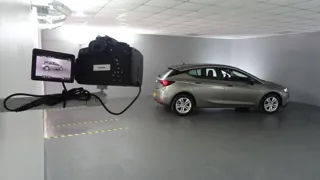Andy Pearce, managing director of CD Auction Group
Among the many challenges and negatives of the pandemic, the industry has some opportunities to move forward positively.
For many companies, 2020 proved to be a watershed moment.
The digital transformation has been widely reported, with researchers at global consulting firm McKinsey, estimating that companies have accelerated their digital plans by three to four years on average.
From the growth of digital remarketing channels to greater use of data and technology in workshops, the industry is set to benefit from a digital dividend for years to come.
But there is also an opportunity to approach the supply chain with a view to greener operations on the road to carbon neutrality.
It is time for a greener set of KPIs to judge the efficiency of the de-fleet and remarketing process.
The use of advanced imaging and data technologies means that vehicles can begin the remarketing process at the inspection phase.
Remote sales mean that vehicles can be prepared and imaged onsite or at a local fulfilment centre.
Not only will this significantly reduce the number of logistics moves, but it will also speed up the time to market, which is essential in a dynamic market.
A broader view of supply chain partners will also be required.
CD Auction Group has partnered with Project-Zero to introduce a carbon offsetting scheme to reduce its carbon footprint to zero.
The programme includes a rigorous measurement of carbon outputs and energy-saving measures, together with carbon offsetting of emissions, including all non-electric vehicle (EV) mileage.
Additionally, we’re committed to being carbon neutral by 2023 and have already moved to make 60% of our company fleet alternative fuelled vehicles (AFV).
The aim is to have 100% of our company cars as AFV by 2025.
It follows new investment in charging infrastructure at its sites across the country as it prepares to handle a rapid increase in the volume of EVs.
Plans for carbon neutrality are happening in tandem with the ambitious steps to reduce our impact on the environment over the next few years, including minimising waste streams.
The change is already underway. One fleet company has increased volumes with CD Auctions because of access to a local de-fleet centre, which will help to reduce the company’s carbon footprint.
GPS vehicle tracking provides a wealth of information to ensure that the journeys that de-fleeted vehicles make are the most efficient and productive they can be.
Optimising routes will have a big impact on reducing the environmental impact. It will also inform thinking about removing links in the chain entirely.
Investment in digital channels means quicker access to a national buyer base and greater flexibility in remarketing the vehicle from a variety of locations.
As the market recovers from the pandemic, the speed to market will continue to pay large dividends.
It’s clear that more traditional auction operators are moving away from their dependency on the physical auction model.
As a digital-first remarketing business, CD Auctions has advocated this model for years, and it’s gratifying to see wider industry moves that will improve efficiency and benefit the environment.
The benefits are clear with operations seeing vehicles de-fleeted on a Tuesday, inspected on a Wednesday and sold on Thursday.
It’s an approach that is saving up to five vehicle movements from the de-fleet and remarketing process, which delivers a greener approach.
As the automotive industry addresses its carbon footprint, the move to alternative fuelled vehicles in everything from passenger cars to transporters will lead to new thinking about the processes involved across the vehicle life cycle.
Technology is advancing every day, and the fleet industry has the opportunity to re-evaluate its approach to every part of the de-fleet and remarketing process.
The good news is that the supply chain is already taking big steps to make a difference in every aspect of its operations.




















Login to comment
Comments
No comments have been made yet.